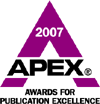 Breaking Industry News
Breaking Industry News
Breaking News articles for July 2007
GS Online: 4.2 million and climbing ...
Tuesday, July 31, 2007
 The Green Sheet's Web site, GS Online, received 4.2 million hits in July, about an 8% jump from the previous month and a 36% increase from the same period last year.
"Our Web traffic has been growing steadily over the last few years, but we knew 2007 would be strong when we saw 3.7 million hits in January," said Kate Gillespie, General Manager and Chief Operating Officer.
The Green Sheet's Web site, GS Online, received 4.2 million hits in July, about an 8% jump from the previous month and a 36% increase from the same period last year.
"Our Web traffic has been growing steadily over the last few years, but we knew 2007 would be strong when we saw 3.7 million hits in January," said Kate Gillespie, General Manager and Chief Operating Officer.
VeriFone corners NYC taxi business
Wednesday, July 25, 2007
 VeriFone Transportation Systems is now the preferred provider of integrated payment solutions for the Committee for Taxi Safety, New York City's largest taxicab medallion leasing association. The group includes 10 organizations, representing about 3,000 members.
VeriFone Holdings Inc. is the majority shareholder in VTS, a joint venture between VeriFone Holdings and TaxiTronics, which already services over 8,000 of the city's taxi meters.
VeriFone Transportation Systems is now the preferred provider of integrated payment solutions for the Committee for Taxi Safety, New York City's largest taxicab medallion leasing association. The group includes 10 organizations, representing about 3,000 members.
VeriFone Holdings Inc. is the majority shareholder in VTS, a joint venture between VeriFone Holdings and TaxiTronics, which already services over 8,000 of the city's taxi meters.
APEX awards: The Green Sheet's lucky seven
Wednesday, July 11, 2007
 In the 19th Annual Awards for Publication Excellence (APEX), The Green Sheet Inc. won seven awards overall, including a Grand Award.
The 2007 awards, announced this month by Communications Concepts Inc., were for publications and articles that appeared in 2006. Award winners were chosen from among 4,916 entries.
In the 19th Annual Awards for Publication Excellence (APEX), The Green Sheet Inc. won seven awards overall, including a Grand Award.
The 2007 awards, announced this month by Communications Concepts Inc., were for publications and articles that appeared in 2006. Award winners were chosen from among 4,916 entries.
Discover flying solo
Tuesday, July 03, 2007
 Like a baby bird cast from its nest, Discover Financial Services LLC has left the Morgan Stanley fold. The Discover brand, which has consistently lagged behind bank cards and American Express Co. as a favored payment instrument, is now an independent company trading as DFS on the New York Stock Exchange.
Trading began July 2, following a distribution of Discover common stock to Morgan Stanley shareholders. They received one share of Discover for every two shares of Morgan Stanley common stock.
Like a baby bird cast from its nest, Discover Financial Services LLC has left the Morgan Stanley fold. The Discover brand, which has consistently lagged behind bank cards and American Express Co. as a favored payment instrument, is now an independent company trading as DFS on the New York Stock Exchange.
Trading began July 2, following a distribution of Discover common stock to Morgan Stanley shareholders. They received one share of Discover for every two shares of Morgan Stanley common stock.

